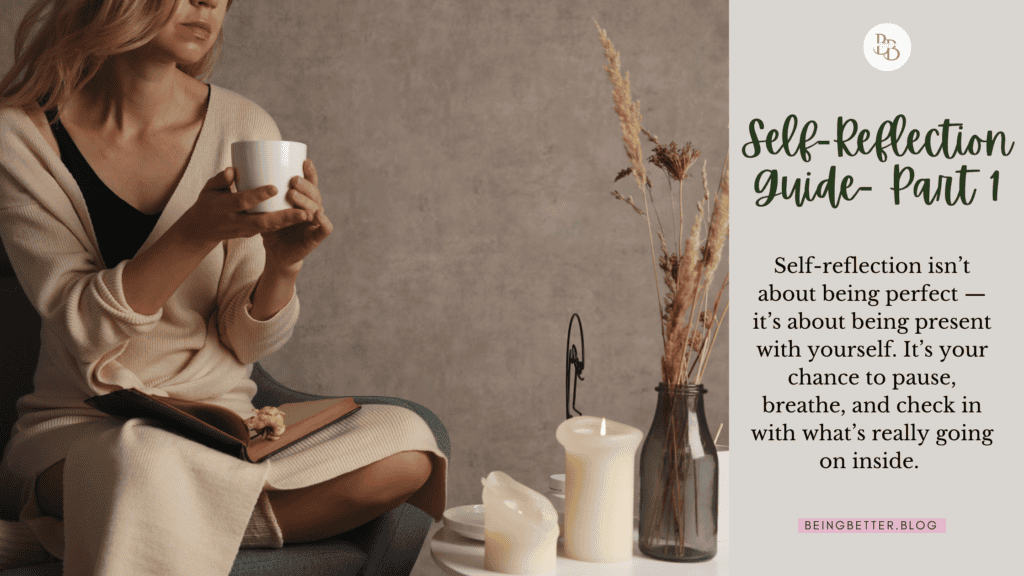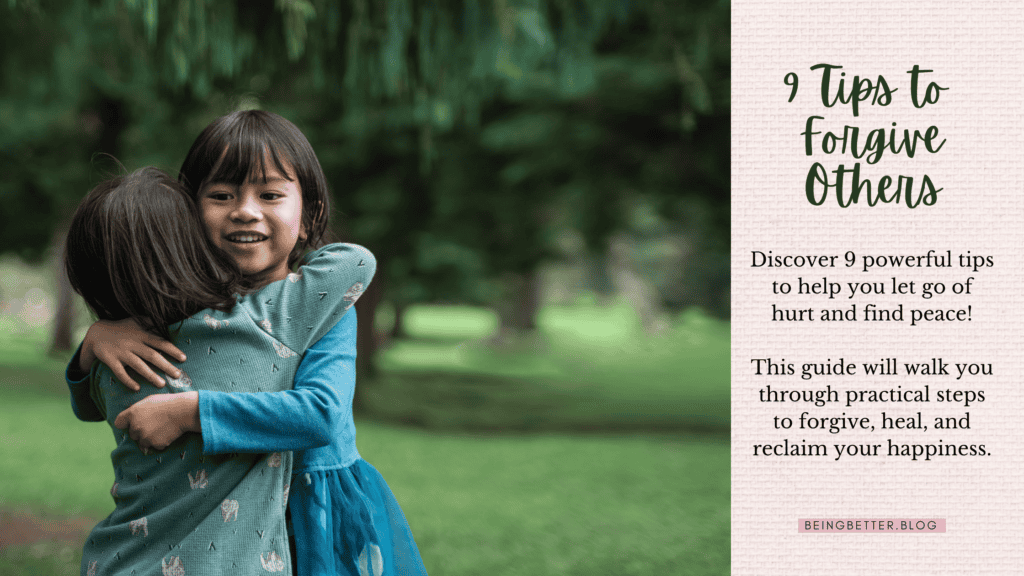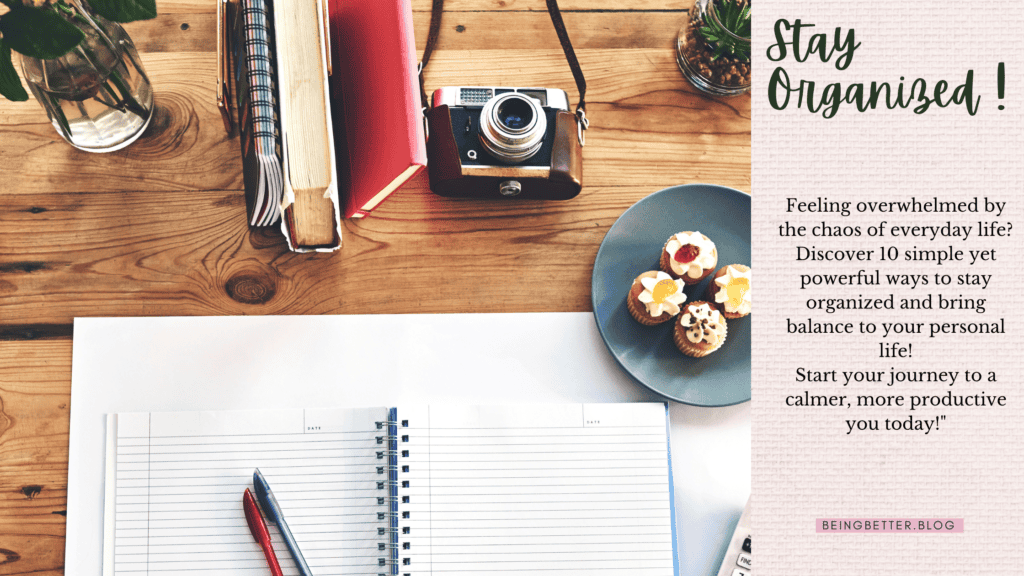Table of Contents
What Is Self-Reflection?
Self-reflection is the conscious practice of turning our attention inward, taking a step back from the outside world to explore our own thoughts, feelings, behaviors, and choices. It’s about slowing down, creating space for honesty, and asking ourselves questions that help us grow.
It’s not about criticizing ourselves or overanalyzing everything. Instead, it’s about gently understanding:
- Why do you do what you do
- How certain experiences have shaped you
- What your emotional reactions are telling you
- What’s truly important to you
- What areas of your life need more attention, healing, or change
At its heart, self-reflection is a tool for personal awareness and transformation.
Imagine It Like a Mirror for Your Inner World
We usually look in a mirror to check our appearance. Self-reflection is like holding up a mirror for your inner self—your thoughts, values, fears, hopes, and habits. You’re not trying to look perfect. You’re simply observing who you are at the moment, without filters.
It helps you ask:
- “How did that situation make me feel, and why?”
- “What can I learn from how I handled that challenge?”
- “Am I living in a way that matches my values?”
- “What do I need more or less of in my life right now?”
This process creates clarity, emotional balance, and personal power.
A Mental and Emotional Reset Button
Life moves fast. We often react on autopilot—making choices, forming opinions, or getting emotional without really understanding why. Self-reflection acts as a reset button, helping you become more intentional rather than reactive.
When you regularly take time to reflect, you:
- Make better decisions
- Communicate more clearly
- Understand your emotions
- Break harmful patterns
- Strengthen your relationships
- Develop greater self-trust and confidence
It’s a quiet, yet powerful way to realign your life.
Self-reflection isn’t always easy. Sometimes, it reveals things we’ve been avoiding—like mistakes we made, fears we haven’t faced, or truths we’ve been ignoring. But that’s where growth begins. When done with kindness, patience, and honesty, self-reflection helps you heal, improve, and evolve.
You don’t have to fix everything at once. You just have to be willing to look inward and take the next small, honest step forward.
Why Self-Reflection Is Totally Worth It
(Let’s talk about how it can genuinely change your life)
Sometimes we’re so caught up in daily routines and responsibilities that we forget to pause and ask ourselves: “How am I really doing?” That’s where self-reflection comes in — and trust me, the benefits are truly life-changing. Let’s dive into how it can help you feel more clear, confident, and in control of your life.
1. Helps You Understand Yourself Better
Self-reflection is like a personal check-in. When you take time to notice your thoughts, emotions, and behaviors, you begin to understand:
- What triggers you
- What motivates you
- What truly matters to you
It’s how you start building a real connection with yourself, not who the world wants you to be, but who you actually are.
2. Gives You Clarity in Decision-Making
Ever felt stuck or confused about what to do next? Reflecting helps clear the mental fog.
You get to ask:
- “What do I really want?”
- “Is this choice aligned with my goals or values?”
When you know your “why,” making the right decisions becomes a whole lot easier.
3. Improves Your Relationships
When you understand your own emotions and behavior patterns, you show up more mindfully in relationships.
You begin to:
- Communicate with more empathy
- Apologize when needed (without ego)
- Set healthier boundaries
- Avoid repeating the same arguments or mistakes
A better “you” naturally creates better connections.
4. Breaks Negative Patterns
We all have habits or emotional cycles we’d rather change—whether it’s procrastination, self-doubt, or getting angry too quickly.
Self-reflection shines a light on these patterns and helps you ask:
- “Why do I keep doing this?”
- “What can I do differently next time?”
This awareness is the first and most powerful step toward change.
5. Supports Personal Growth
Self-reflection isn’t just about solving problems—it’s also about growing into your best self.
When you reflect regularly, you start noticing:
- Your progress (even small wins!)
- How much stronger and wiser you’ve become
- What areas you’re ready to improve next
Growth doesn’t always mean big leaps—it often starts with quiet reflection.
6. Reduces Stress and Overthinking
Ironically, thinking about your thoughts can actually reduce mental chaos.
Self-reflection helps you:
- Understand your emotions
- Release bottled-up feelings
- See situations more clearly and calmly
It’s like clearing mental clutter, which can bring a huge sense of peace.
7. Keeps You Aligned With Your Goals
Sometimes we set goals… and then forget why we even wanted them.
Self-reflection reconnects you with your purpose and lets you check:
- “Am I still on the path I want to be on?”
- “Do I need to shift something?”
- “Am I living intentionally?”
It keeps you from living on autopilot and steers you back toward your dreams.
8. Builds Confidence and Self-Trust
The more you understand yourself, the more you believe in yourself.
Self-reflection teaches you that:
- You’re capable of growth
- You’ve overcome more than you realized
- You can handle what comes next
And that builds the kind of quiet confidence that lasts.
9. Encourages Self-Compassion
Sometimes we’re hardest on ourselves. But when you reflect honestly and kindly, you start to see:
- You’re a work in progress (and that’s okay)
- Everyone makes mistakes
- You’re doing your best with what you know
And that mindset? It changes everything.
When & Where to Reflect: Creating the Right Space for Self-Reflection
Self-reflection works best when you feel calm, safe, and free from distractions. The goal is to create an environment that lets your thoughts surface naturally, without pressure, noise, or interruptions.
Here’s how to choose the best time and environment for a powerful self-reflection session:
Best Time for Self-Reflection
There’s no one-size-fits-all time, but here are a few great options depending on your schedule and personality:
1. Early Morning (Before the World Wakes Up)
- Quiet, peaceful energy
- Your mind is clear and less cluttered
- Great for setting intentions and checking in before the day begins
Try this if: You enjoy journaling with a warm cup of tea or coffee while the sun rises.
2. Evening or Bedtime
- Helps you process the events of the day
- A chance to release emotions or tension before sleeping
- Encourages restful, thoughtful closure
Try this if: You want to reflect on lessons, thoughts, or patterns from your day.
🧘♀️ 3. After a Triggering or Emotional Event
- A useful time to ask, “What just happened?” and “Why did I react that way?”
- Brings awareness to emotional triggers or growth opportunities
Try this if: You want to avoid bottling up emotions and learn from moments in real-time.
📅 4. Weekly or Monthly Check-In
- A longer reflection session to see the bigger picture
- Helps you track growth, patterns, and goals
Try this if: You want to build a habit of consistent self-awareness and intention-setting.
Best Environment for Self-Reflection
Your environment can shape the quality of your reflection. Look for a space that feels safe, personal, and quiet.
Here are some calming options:
🪴 1. A Quiet Corner in Your Home
- Cozy up with a journal, blanket, candle, or soft music
- Familiar and private
Try adding: a plant, diffuser, or gentle lighting to make it feel more inviting.
🌳 2. In Nature (Park, Garden, Beach, Balcony)
- Nature naturally slows you down and grounds your thoughts
- Ideal for walking reflection or sitting with a notebook
Try this if: You feel mentally stuck and need fresh air or movement.
✈️ 3. During Travel (Flights, Long Drives, Solo Trips)
- Time away from your usual routine brings new clarity
- Great opportunity for deeper life reflections
Bring a journal or use a notes app to capture your insights.
🛁 4. In the Shower or Bath
- Surprisingly reflective space!
- Your mind tends to wander freely when your body is relaxed
Try this if: You like short mental check-ins without needing tools or structure.
- Keep distractions away (turn off notifications, silence your phone)
- Use a journal or voice notes to organize thoughts
- Add calming elements like soft music, candles, or incense
- Be kind to yourself—reflection is not about perfection
The best time and space for self-reflection is the one where you feel most honest, comfortable, and undisturbed. It doesn’t have to be fancy—just intentional. Whether it’s five minutes in the morning or a weekend walk in nature, the simple act of slowing down and checking in with yourself can bring clarity, peace, and direction.
A Step-by-Step Guide to Start Self-Reflection
Simple, practical, and meant for real life — not just theory.
Let’s be honest — the idea of “self-reflection” sounds lovely… but where do you actually start? What do you write? What do you think about? What if nothing comes to mind?
Don’t worry — I’ve been there. That’s why I’ve broken it down into small, doable steps that actually work.
🕰 Step 1: Choose the Right Time to Reflect
Self-reflection works best when you’re not rushed, distracted, or emotionally overwhelmed. That’s why choosing the right time is the first and most important step.
Best times to reflect:
- Early morning – Your mind is fresh, and you can set intentions for the day.
- Before bed – Great for reviewing what went well, what didn’t, and how you felt.
- Weekend mornings – More time, more calm — ideal for deeper emotional work.
- After a strong emotional experience – Reflection helps process and release feelings.
🗣️ “Personally, I find night-time reflections the most honest. When the world is quiet, my thoughts feel clearer.”
🛋 Step 2: Create a Calm, Distraction-Free Environment
Where you reflect matters. You don’t need anything fancy — just a peaceful space where you can tune in to your inner voice.
Set the scene:
- Find a quiet, cozy spot — even a small corner with a cushion works.
- Dim the lights or light a candle.
- Keep your phone away or on silent.
- Bring a notebook, journal, or even your phone’s voice recorder or notes app.
- Optional: Play calming music or sit by a window or plant — nature helps.
🌿 The goal is simple: help your mind slow down so your heart can speak up.
🧠 Step 3: Pick Your Reflection Method
Not everyone loves writing, and that’s okay. Choose a format that feels natural and sustainable for you.
Your options:
- ✍️ Journaling – Writing helps organize thoughts and process emotions deeply.
- 🎙 Voice notes – Talking aloud can help you hear your own truth.
- 🧘♀️ Silent reflection – Thinking quietly works for shorter daily check-ins.
- 🎨 Creative reflection – Draw, doodle, or create a mood board of your feelings.
🗣️ “Some days I write. Other days, I just speak into my phone while walking — and that’s enough.”
❓ Step 4: Ask Yourself Reflective Questions
Now that you’re ready, it’s time to go inward. Start with 1–3 questions and allow your thoughts to unfold honestly.
Powerful prompts to guide you:
- What emotions am I carrying today?
- What’s been bothering me lately — and why?
- What am I avoiding or resisting?
- What made me feel alive this week?
- Where do I feel stuck?
- What do I need more of in my life right now?
- What am I grateful for today?
💡 Use prompts like these to peel back the layers and find what’s underneath your surface feelings.
🧾 Step 5: Write or Speak Freely (No Filters Allowed!)
This is the heart of self-reflection — where the real magic happens. Let go of rules, grammar, structure, or judgment.
Here’s how to do it right:
- Don’t edit as you go. Just write or speak.
- If you get stuck, write: “I don’t know what to say…” and keep going.
- Be raw. Be real. Be messy. No one’s watching.
- Focus on feelings, not just facts. Instead of “I didn’t complete my task,” try “I felt unmotivated and frustrated.”
🗣️ “Some of my most healing reflections came from the messiest pages in my journal.”
🔍 Step 6: Look for Repeating Patterns and Truths
After a few sessions, go back and read or listen to what you’ve recorded. This step helps you understand your emotional patterns and make sense of what’s really going on.
Ask yourself:
- What emotions show up often?
- Are there recurring triggers or situations that affect me?
- What beliefs keep surfacing?
- Where do I see growth?
- What’s working well — and what isn’t?
📖 You’re not just reviewing words — you’re uncovering insights.
🎯 Step 7: Turn Insights Into Gentle Action
Now that you understand yourself better, it’s time to use that awareness. What small changes can you make based on what you’ve discovered?
Examples:
- If you always feel stressed on Mondays → Plan Sunday night wind-downs.
- If you often feel lonely → Schedule more connection time.
- If you keep avoiding a task → Reflect on whether it aligns with your values.
You don’t have to overhaul your life. Even tiny shifts — repeated over time — can change everything.
🗣️ “I realized I was saying yes too much out of guilt. Now, I pause before agreeing — and it feels so freeing.”
🧡 Step 8: End with Kindness and Gratitude
Always wrap up your reflection with a soft, compassionate note — no matter what came up.
You can:
- Write a thank-you note to yourself
- Affirm: “I’m proud of myself for showing up”
- Say: “I’m learning, and that’s enough”
- List 3 things you’re grateful for in that moment
🌸 Ending kindly helps rewire your brain to feel safe with emotional exploration.
🔁 Step 9: Make It a Habit
Reflection is most powerful when it becomes a regular part of your life — like brushing your emotional teeth!
Try this:
- Reflect once a week to start (e.g., “Sunday check-ins”)
- Use a journaling app like Day One or Notes
- Create a small ritual: tea + journal + music
- Pair it with something you already do (like morning coffee)
📆 The goal isn’t to be perfect — it’s to stay connected to yourself.
There’s No ‘Perfect’ Way to Reflect
Self-reflection isn’t about being perfect — it’s about being present with yourself. It’s your chance to pause, breathe, and check in with what’s really going on inside. By creating the right space, asking thoughtful questions, and being honest with yourself, you open the door to real growth, healing, and clarity.
Start small. Stay curious. And remember — the more you understand yourself, the more power you have to create a life that feels right for you.



